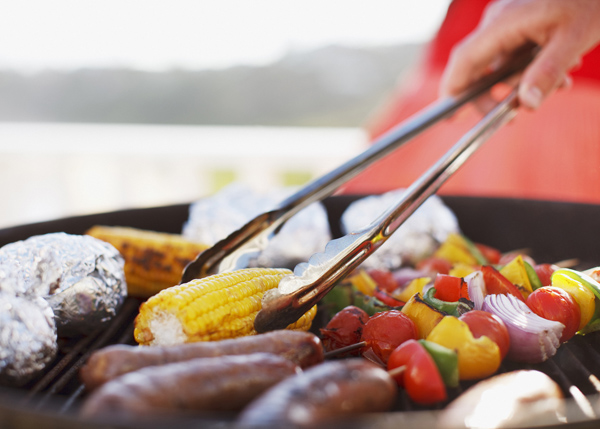By Emily Bailey
Grilling seems as easy as pressing an ignition switch and adding food. But if you want to serve up a nutritionally balanced meal that will fuel your performance (and protect your health), you’ll need to be a bit more mindful about it. This cooking method does keep your kitchen cool and allows you to make a whole meal outside. But it also offers opportunities for cancer-causing substances or bacteria to make an appearance in your dish. Check out these grilling tips so you can be sure to enjoy a healthy, balanced, tasty, and nutritious summer of grilling.
Avoid Common Protein Pitfalls
Grilling meat and fish at high temperatures while over an open flame creates two potential cancer-causing substances: heterocyclic amines (HCAs) and polycyclic aromatic hydrocarbons (PAHs).HCAs are created when meat, poultry, and fish are cooked until they are charred. HCAs are also found in cigarette smoke and have been shown to cause stomach, colon, liver and skin cancer. Polycyclic aromatic hydrocarbons (PAHs) are formed when juices from meat drip onto coals or other hot surfaces and create smoke. These carcinogens are then deposited onto the surface of meat as the smoke swirls around the food. The practices mentioned below can help you ensure a healthier grilled entrée.
Remove visible fat. To prevent PAHs and promote healthy eating, trim the fat off the cuts of meat before grilling. This reduces the amount of fat that can potentially drip onto the coals. Also choose lean cuts: For beef and pork, try a loin or round cut such as filet, flank steak, or tenderloin. For poultry, choose skinless breast meat.
Use a marinade. Marinating the protein before grilling will help form a barrier and prevent the formation of HCAs. It also keeps protein more tender and can add great flavor complements. A citrus marinade also adds an antioxidant boost that helps to destroy the free radicals that are associated with cancer. To prevent PAHs, drain the marinade off of the meat before placing it on the grill. Also avoid spraying olive oil on the grill.
Precook your protein. Another way to prevent HCAs is to precook the protein and finish it on the grill. This allows for shorter cooking time on the open flame. Make sure the meat is not directly over the coals, too. Remember: Always use a separate plate and utensil for raw and cooked meats.
Use smaller cuts. Remember to keep portions in check for overall health. A smaller cut of meat or meat that’s cubed, such as for kebabs, also decreases cooking time.
Avoid grill hot spots. Try to avoid placing food over the “hot spots” of the grill to prevent the creation of HCAs and PAHs. This also helps prevent foodborne illness. Cooking food over a hot spot can mean it’s cooked on the outside but isn’t thoroughly cooked through; that could be a potential food-safety issue. Try to place foods where they will cook more slowly and evenly.
Pay attention to temperature. Because grilling season typically takes place in the warmer outdoors, the bacteria that cause foodborne illness can build up more quickly. General food safety temperature rules: Keep food below 40 degrees or above 140 degrees. Discard any cooked foods if they have been left out for longer than 2 hours. In temperatures above 90 degrees, discard any perishable foods after 1 hour.
Know when to stop. To avoid charring (which creates HCAs), grill meat to “medium” instead of “well done.”
Don’t Forget the Fruits and Vegetables!
Continue making a well-rounded meal by grilling fruits and vegetables. Having a half-plate of these summer jewels will also make it easier to keep protein portions moderate. What’s more, you don’t have to worry about charring them: When vegetables or fruits char they do not create carcinogens!
What they do offer is phytochemicals: biologically active compounds found in plants, which aid in immunity and reduce the inflammation and oxidative damage that can spark cancer growth.
Therefore, make sure to include fruits and vegetables at every meal. To enjoy a wider array of nutrients, choose produce in a variety of colors. Some tasty options are asparagus, zucchini, peppers, peaches and pineapple.
Have a Side of Starch
Complete your meal on the grill by using it to cook corn on the cob in the husk or to grill some sweet potatoes. Another delicious idea: Add a foil pack (or grill basket) of potatoes with chopped onions, peppers, and garlic.
Keep It Clean
After dinner’s done and the grill is cool, clean up the grill when you do the dishes. Scrubbing the grill grates will minimize the buildup of carcinogens there, which also makes your future meals taste better.
Some Marvelous Marinade Options
Give these a try, or experiment and create your own combos this summer!
- Chicken: Combine lemon, olive oil, pepper and basil.
- Asparagus: Combine olive oil, pepper and rosemary.
- Peaches: Combine honey, butter and cinnamon.
References:
Academy of Nutrition and Dietetics. 2017. Website. www.eatright.org.
Duyff, R. L. 2012. American Dietetic Association Complete Food and Nutrition Guide (4th ed.) Hoboken, NJ: John Wiley & Sons, Inc.

